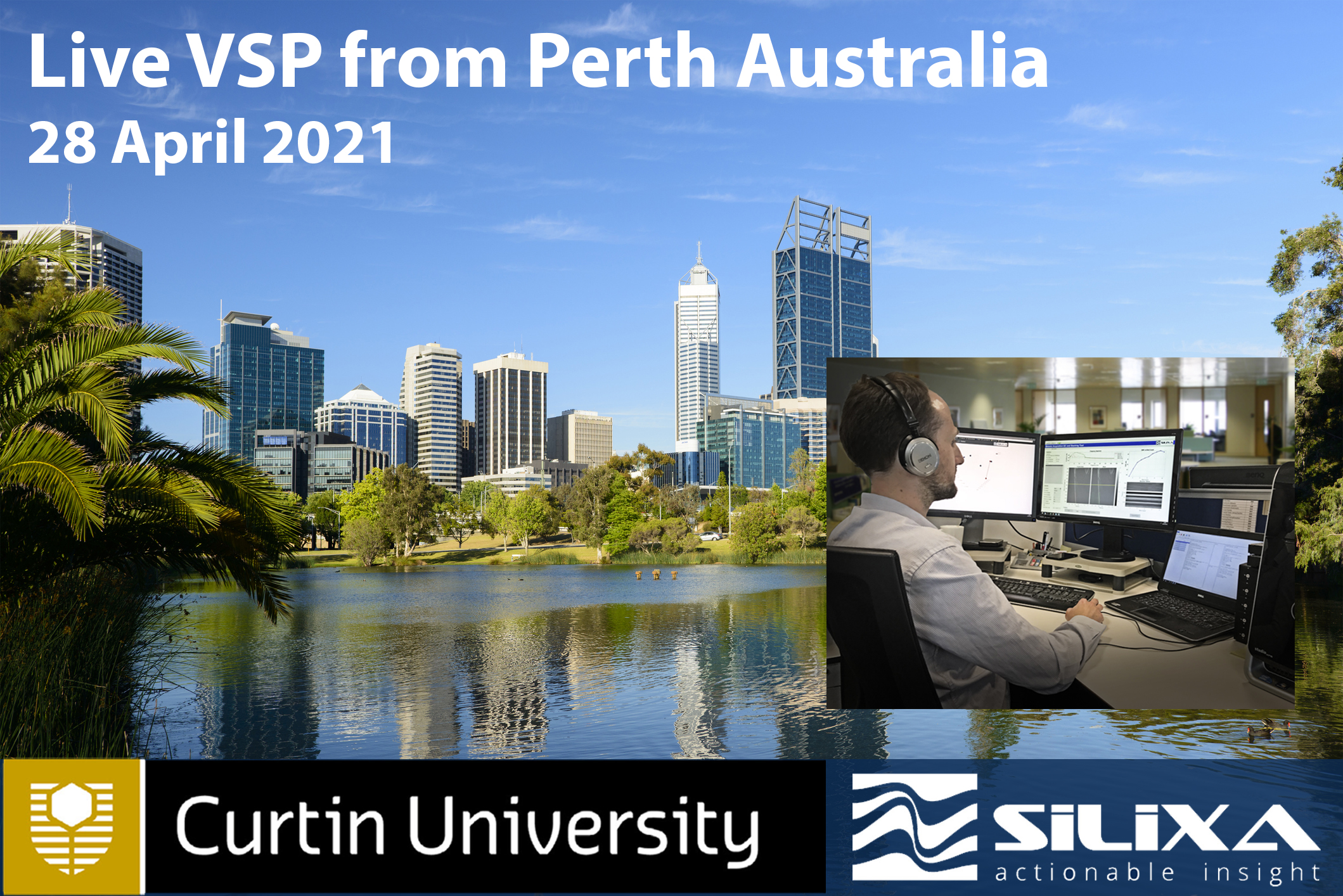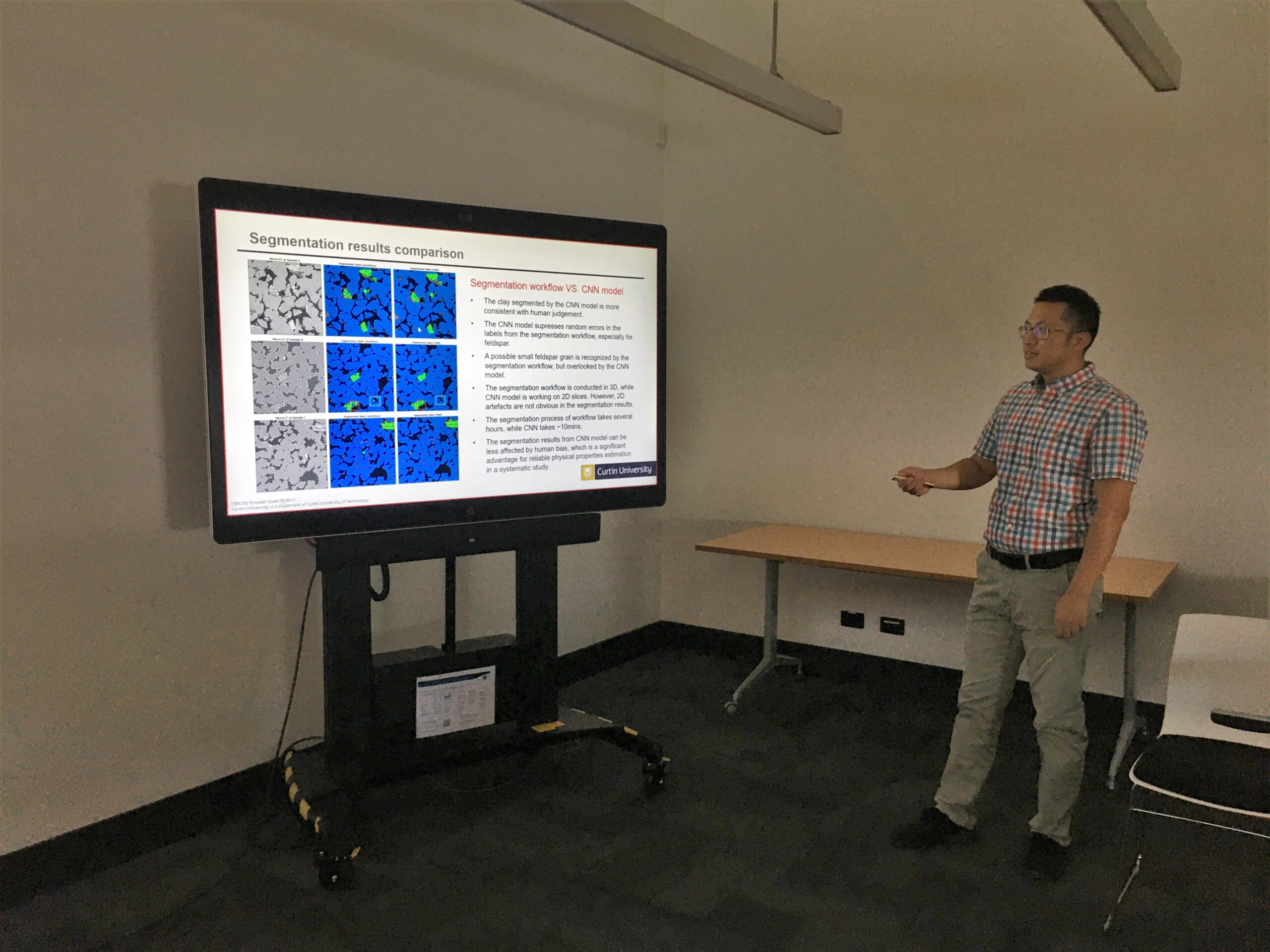News and Events
5/26/2025 – CEG List of Talks at the EAGE Annual Meeting 2025
The Centre for Exploration Geophysics will be present at the EAGE Annual Meeting 2025 in Toulouse, France on 2-5 June 2025. We welcome you to visit our booth (UNI14) and attend our talks… Read more…
6/12/2024 – Professor Boris Gurevich Awarded the “John Curtin Distinguished Professor” Title
Professor Boris Gurevich has been awarded the “John Curtin Distinguished Professor” title for a subsequent five-year period. The conferral of the honorary award title is a prestigious honour and recognises his ongoing capacity to provide a significant and sustained contribution to the University, as evidenced by his distinguished national and international academic reputation; exceptional research skills; and distinguished record of service to professional and public life. Read more…
15/10/2024 – PhD student Nikita Beloborodov received the prestigious “Laric Hawkins Award” for the most innovative use of a geophysical technique from a paper presented at ASEG2024 conference.
Nikita Beloborodov received the prestigious “Laric Hawkins Award” for the most innovative use of a geophysical technique from a paper presented at the conference. The paper titled “A field trial of cross-well seismic with DAS and a high-frequency source” by Nikita Beloborodov, Konstantin Tertyshnikov, Olivia Collet, Roman Isaenkov, Mikhail Vorobev, Pavel Shashkin, Boris Gurevich, and Roman Pevzner. This is a massive achievement given that the award is not limited to papers presented by students or early-career researchers. Read more….
16/06/2024 – The Geological Carbon Storage Seismic Monitoring Team won the “2023 Research Team Award for Industry Engagement and Impact” award
As part of the School of Science and Engineering Pro Vice-Chancellor Staff Excellence Awards, the geological carbon storage seismic monitoring team was awarded the Research Team Award for Industry Engagement and Impact. Read more…
16/04/2024 – ASEG’s PREVIEW issue 229 featuring Prof. Boris Gurevich
The Australian Society of Exploration Geophysics featured Professor Boris Gurevich on its PREVIEW issue 229 and as part of the Education Matters section series interviewing leaders from the industry, government and academia. In this interview, Prof. Gurevich shared his views on geophysics education, research and more… Read more.
02/02/2024 – Geophysics Discipline, School of Earth and Planetary Sciences BBQ Event
On 2 February 2024, the Geophysics discipline held a social BBQ event that was well attended by researchers and students from different disciplines within the School of Earth and Planetary Sciences at Curtin University… Read more
28/06/2023 – A Curtin TLE paper received an Honourable Mention in the category of Best Paper in 2022
A paper by a Curtin PhD student and staff Distributed fibre-optic sensing transforms an abandoned well into a permanent geophysical monitoring array: A case study from Australian South West, by Evgenii Sidenko, Konstantin Tertyshnikov, Boris Gurevich, Roman Isaenkov, Ludovic Ricard, Sandeep Sharma, Dominique Van Gent, and Roman Pevzner, published in Volume 41, No. 2, February 2022, received Honourable Mention in the category of Best Paper in The Leading Edge in 2022… Read more
2022 CRGC Annual Meeting Information
The 2022 Curtin Reservoir Geophysics Consortium Annual Meeting was held in hybrid mode (in-person and online) from the 22nd to the 24th of November over three afternoons from 1pm to 4:30pm.
The face-to-face meeting took place at the Yancep Inn, 3499 Wanneroo Road, Yanchep Western Australia.
21/09/2022 – Curtin/CSIRO Geophysics Group Seminar
On Wednesday 21st September 2022, Senior Research Fellow Dr Konstantin Tertyshnikov, Exploration Geophysics, Curtin University, presented a seminar titled: A rapid VSP acquisition with DAS in mineral exploration.
In the last decade distributed fibre optic acoustic and temperature sensing has become quite extensively utilised for various reservoir exploration and monitoring tasks.
Specifically, it gained a lot of attention for downhole seismic applications due to distinct directional sensitivity of fibre optic sensors along a cable and in addition due to usual downhole acquisition geometry, where P-waves approaching receivers along a bore and a cable… Read more
1/09/2022 – Curtin/CSIRO Geophysics Group Seminar
On Wednesday 21st September 2022, Senior Research Fellow Dr Konstantin Tertyshnikov, Exploration Geophysics, Curtin University, will present a seminar titled: A rapid VSP acquisition with DAS in mineral exploration.
In the last decade distributed fibre optic acoustic and temperature sensing has become quite extensively utilised for various reservoir exploration and monitoring tasks.
Specifically, it gained a lot of attention for downhole seismic applications due to distinct directional sensitivity of fibre optic sensors along a cable and in addition due to usual downhole acquisition geometry, where P-waves approaching receivers along a bore and a cable… Read more
18/08/2022 – Curtin/CSIRO Geophysics Group Seminar
On Thursday 18th August 2022, Senior Research Scientist Kitty L. Milliken, Bureau of Economic Geology, University of Texas at Austin, presented a seminar titled: Mudrocks (shales, mudstones) at the Scale of Grains and Pores: Current Understanding.
The fine-grained sediments and rocks that constitute most of the sedimentary record have received tremendous research attention in the past decade. This talk reviews some of the technologies that have supported these advances and summarizes current knowledge of the pore-scale processes that drive the evolution of bulk rock properties of mud in the subsurface… Read more
11/08/2022 – Curtin/CSIRO Geophysics Group Seminar
On Thursday 11th August 2022, Professor Andrej Bona and Research Fellow Pavel Shashkin, CEG Curtin University, presented a seminar titled: Time-lapse impedance monitoring using borehole seismic amplitudes of earthquake waves.
As shown by several recent studies, the amplitude of the direct wave recorded by distributed acoustic sensors can be used as a proxy for the elastic properties. This concept was recently employed by the Curtin geophysics team to monitor temporal changes of elastic properties along the wellbore using waves from both controlled sources and earthquakes… Read more
28/07/2022 – Curtin/CSIRO Geophysics Group Seminar
On Thursday 28th July 2022, Dr Sam Xie, Lecturer, Petroleum Engineering, Curtin University, presented a seminar titled: Reservoir Rock and Fluids Interactions and Their Implications on Geo-Energy and Energy Storage.
Reservoir Rock-Fluids Interactions are important physiochemical processes, which play an important role in Hydrocarbon Recovery, CO2 Geological Storage, and Underground Hydrogen Storage. Understanding such physiochemical processes at small length scale (nano-, micro- and core-scale) will enable industry to better manage uncertainties and risks at large-scale… Read more
21/07/2022 – Curtin/CSIRO Geophysics Group Seminar
On Thursday 21st July 2022, Professor Maxim Lebedev, Exploration Geophysics, Curtin University, presented a seminar titled: Distributed acoustic sensing (DAS) for seismic-frequency laboratory measurements of elastic properties: recent progress.
Forced-oscillation stress-strain laboratory measurements are increasingly employed to obtain elastic and viscoelastic properties of rocks at seismic frequencies. Yet these measurements are slow time-consuming and expensive, due in part to the use of metal or semiconductor strain gauges, which need to be glued to the sample…. Read more
30/06/2022 – Curtin/CSIRO Geophysics Group Seminar
On Thursday 30thth June 2022, Dr. Pilar Di Martino presented a seminar titled: Seismic attenuation parameters in volcanic rocks at a variety of scales.
Interpretation of seismic data is the most common geophysical method used for mapping and characterising the interior of the Earth. However, an important portion of this data is attenuated by seismic scattering and absorption, which manifest themselves as seismic coda waves…. Read more
16/06/2022 – Curtin/CSIRO Geophysics Group Seminar
On Thursday 16th June 2022, Dr. Alexandra Roslin (University of Queensland), presented a seminar titled: Implementation of deep learning algorithms for digital rock analysis.
Nowadays, deep learning algorithms are widely used for many geosciences applications, including digital rock analysis. For example, deep learning may increase the accuracy of image segmentation or perform rock type classification, enhance the resolution of the micro-CT images and suppress the background noise… Read more
02/06/2022 – Curtin/CSIRO Geophysics Group Seminar
On Thursday 2nd June 2022, Brett Harris, Professor, Discipline Lead – Exploration Geophysics, WASM: Minerals, Energy and Chemical Engineering, Curtin University, presented a seminar titled: Water for food, desalination and how to find fractured rock aquifers with geophysics and drilling; examples from the Wheatbelt of Western Australia.
Supply of high-quality water is critical for global food production. This challenge can be acute in arid to semi-arid regions. New water treatment technologies such as solar driven desalination have potential to transform brackish groundwater into water suitable for food production at reasonable cost… Read more
19/05/2022 – Curtin/CSIRO Geophysics Group Seminar
On Thursday 19th May 2022, Boris Gurevich, John Curtin Distinguished Professor, Director of Centre for Exploration Geophysics, WASM: Minerals, Energy and Chemical Engineering, Curtin University, presented a seminar titled: Applicability of Gassmann theory to fully and partially saturated nano-porous media.
Recent progress in extraction of unconventional hydrocarbon resources has ignited the interest in the studies of nanoporous media. Since many thermodynamic and mechanical properties of nanoscale solids and fluids differ from the analogous bulk materials, it is not obvious whether wave propagation in nanoporous media can be described using the same framework as in macroporous media… Read more
05/05/2022 – Curtin/CSIRO Geophysics Group Seminar, 5th May 2022
On Thursday 5th May 2022, Matthew W Becker, Professor of Geology, Conrey Chair in Hydrogeology California State University , presented a seminar titled: Measuring Hydromechanical Strain using Fiber Optic Distributed Acoustic Sensing.
“Mapping subsurface hydraulic connectivity and storage is a requirement for petroleum resources, geothermal energy, groundwater resources, and aquifer remediation, among other applications. Hydraulic connections are complex in most geologic environments so measurements of permeability and storativity (compliance) that are averaged over screened or perforated intervals can be very limited in practice.”
10/02/2022 – Case Study: Ambient seismic noise in an urban environment
Ambient seismic noise in an urban environment: case study using downhole distributed acoustic sensors at the Curtin University campus in Perth, Western Australia
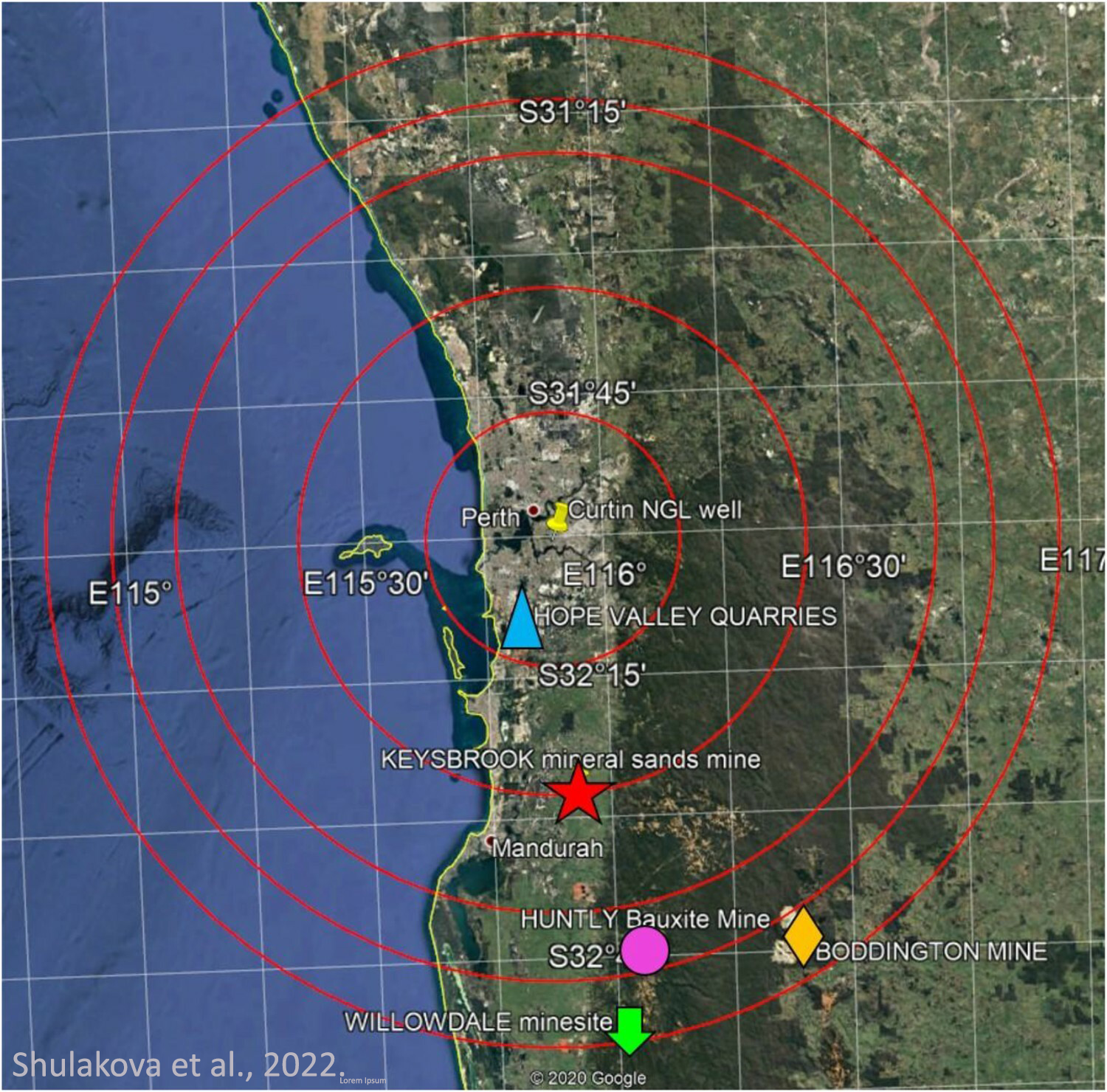
A systematic analysis of the data recorded passively with a DAS system in a 900-m deep well over a period of 12 weeks in the Perth metropolitan area, Western Australia, reveals the presence of several types of ambient energy in the subsurface, such as earthquakes, ocean swell and urban noise.
Read more and download the data…
Carbon Capture, Utilisation and Storage (CCUS) is now, more than ever, a critical technology in reducing carbon emissions. To manage CO2 storage containment and conformance, acquiring, monitoring, and comparing data to predictions is necessary.
During the CO2CRC Stage 3 Otway Project, Curtin Geophysics Centre for Exploration Geophysics, in collaboration with partners, developed borehole based seismic monitoring technologies to reduce the cost and environmental footprint of long-term CO2 storage monitoring.
Our automated system detected injected CO2 as small as 300 tonnes at a depth of 1.5 km (https://lnkd.in/gk77_dse).
Read more of our recent CO2 publications here…
Curtin/CSIRO Geophysics Group Seminar
The latest Curtin / CSIRO Geophysics Group Seminar was held on Thursday the 9th of September 2021 where Curtin Geophysics research student Sana Zulic presented a talk titled “Subsurface characterisation using Full Waveform Inversion of Vertical Seismic Profile data: Example from the Curtin GeoLab well”.
Curtin/CSIRO Geophysics Group Seminar
The latest Curtin / CSIRO Geophysics Group Seminar was held on Thursday the 12th of August 2021 where CSIRO researcher Valeriya Shulakova presented a talk titled “Probing nonlinear elastic properties of the subsurface using seismic waves: Theory & experiment”.
Read more…
Curtin/CSIRO Geophysics Group Seminar
The latest Curtin / CSIRO Geophysics Group Seminar was held on Thursday the 5th of August 2021 where Curtin University Exploration Geophysics Research Fellow Alexey Yurikov presented a talk titled “Distributed Acoustic Sensing for Laboratory Measurements of Elastic Properties at Seismic Frequencies ”.
Read more…
Congratulations to Curtin Exploration Geophysics PhD final year student Sofya Popik, who is a recipient of the 2020-2021 WA branch Australian Society of Exploration Geophysicists (ASEG) Student Award.
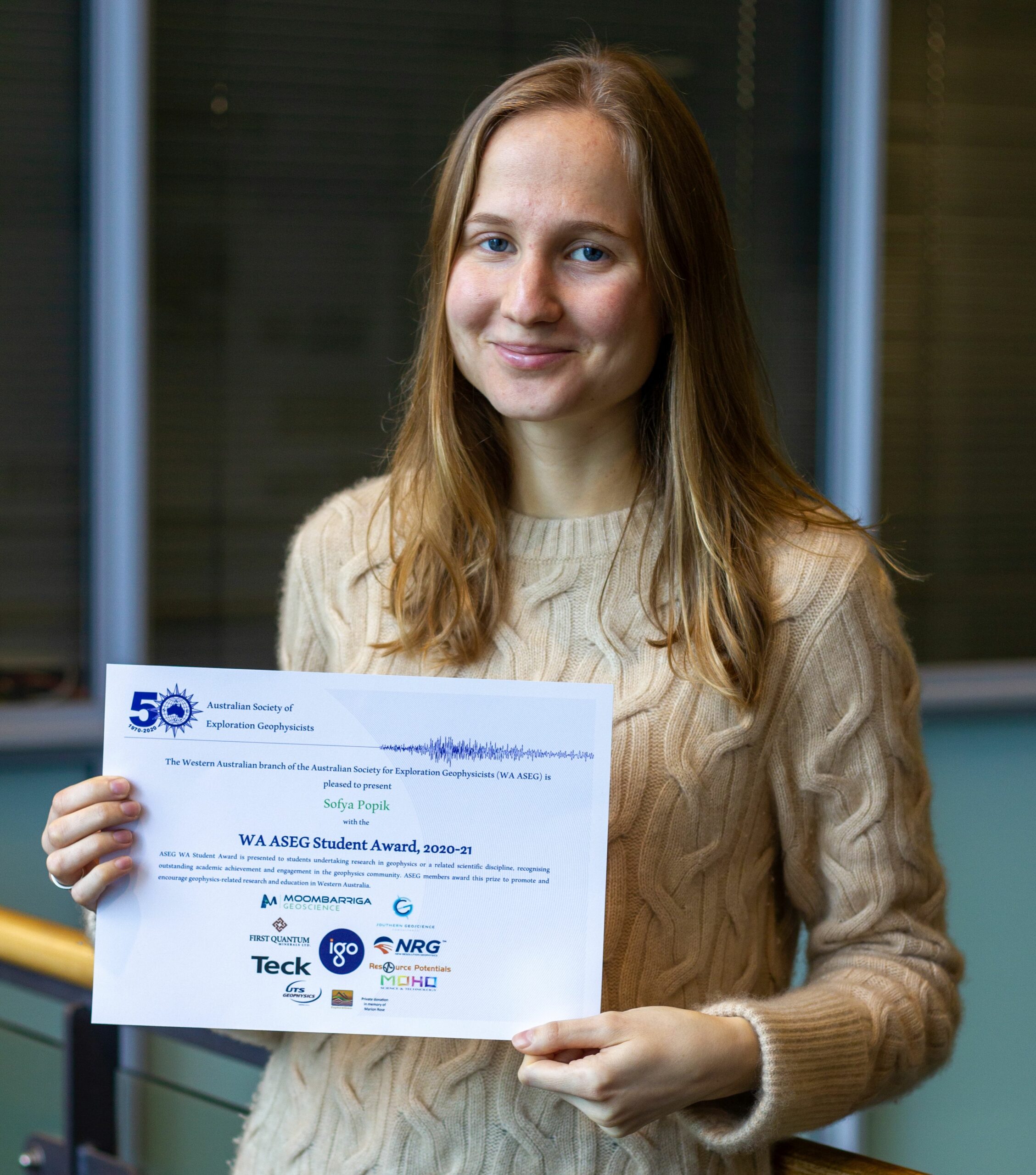
This award provides students with a travel grant to attend the Australasian Exploration Geoscience Conference (AEGC) conference in Brisbane in 2021. It is given to students who are undertaking research in geophysics and other related scientific disciplines in recognition of their outstanding academic achievements and engagement in the geophysics community.
Sofya’s PhD is a part of the CO2CRC Otway Project and is about the integration of borehole and surface seismic monitoring techniques in CO2 geosequestration projects with the main focus on anisotropic velocity model building for improved characterisation of the subsurface. In her PhD Sofya works with innovative technologies such as 4D (time-lapse) surface and borehole seismic, and fibre-optic distributed acoustic sensing (DAS).
Curtin/CSIRO Geophysics Group Seminar
The latest Curtin / CSIRO Geophysics Group Seminar was held on Thursday the 15th of July 2021 where Curtin University Exploration Geophysics PhD student Rabea Sedaghat presented a talk titled “The effect of large scale geo-electrical structures on inversion of magnetotelluric data”.
Congratulations to Curtin Exploration Geophysics student Anatolii Pakhomenko, who is a winner of the WA Datascience Innovation Hub 2021 Geospatial Datathon.
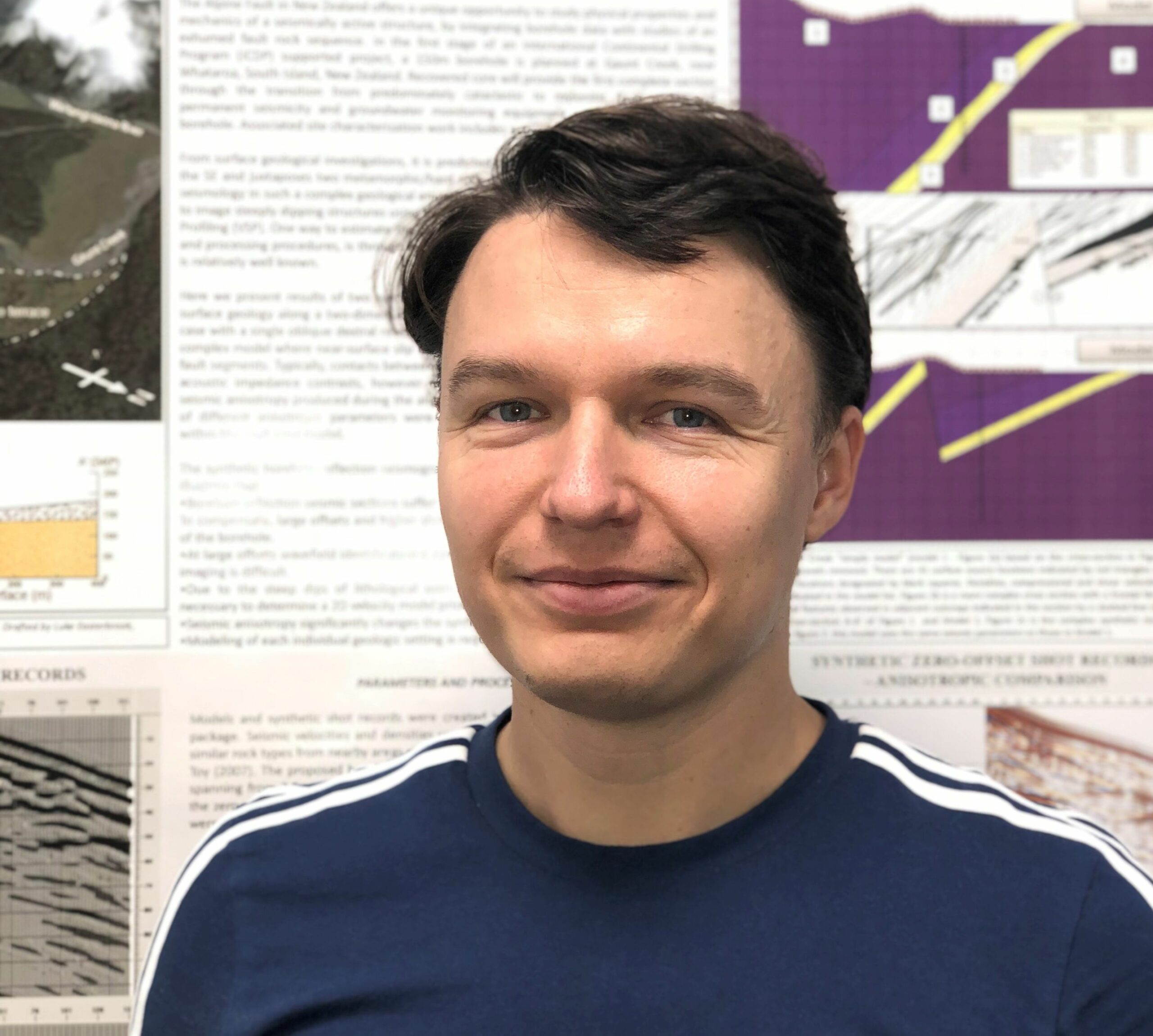
The multidisciplinary teams competing in the datathon were given two days to devise a proof of concept for a data-driven solution to address a real-world challenge. The set challenges were centred around: spatial anonymisation, incomplete data, data amalgamation for emergency response, and data amalgamation for rental stress analysis.
Anatolii is an Exploration Geophysics Master of Philosophy student who is currently researching the use of machine learning for processing data from distributed acoustic sensing to automate and improve the quality of imaging and characterisation during mineral exploration.
MEDIA RELEASE – Monday 5 July 2021
John Curtin Distinguished Professor Boris Gurevich, Director of the Centre for Exploration Geophysics, Western Australian School of Mines: Minerals, Energy and Chemical Engineering (WASM:MECE) was presented with the Reginald Fessenden Award by the Society of Exploration Geophysicists (SEG).
The award is presented to individuals who have made major contributions to exploration geophysics, such as an invention or a theoretical or conceptual advancement.
Read the full Curtin University media release here…
Curtin/CSIRO Geophysics Group Seminar
The latest Curtin / CSIRO Geophysics Group Seminar was held on Thursday the 1st of July 2021 where Curtin University Exploration Geophysics PhD student Snezana Petrovic presented a talk titled Elemental Analysis via Prompt Gamma Neutron Activation For Diamond Drilling.
Curtin/CSIRO Geophysics Group Seminar
The latest Curtin / CSIRO Geophysics Group Seminar was held on Thursday the 24th of June 2021 where Curtin University Exploration Geophysics PhD student, Sofya Popik presented a talk titled P-wave anisotropy parameters estimation from multi-well 3D VSP data acquired with geophones and DAS at Otway Site.
Recent staff achievements
Congratulations to Professor Brett Harris, Professor Andrej Bona and Dr Masood Mostofi who all presented at the MinEx CRC Mid-year Science Review a few weeks ago.
With over 150 researchers, students and company representatives on-line, it was a strong reminder that while COVID continues to restrict some movement and interaction, the collaborative and widespread industry-directed research is powering ahead.
On Thursday the 6th of May a group of researchers from the University of Melbourne kindly presented three talks on predictive multiphase-flow simulation for the design of gigatonne CO2 storage sites for the latest Curtin / CSIRO Geophysics Group Seminar.
The presentations were:
“The case for decarbonation and the necessity of CO2 geo-sequestration“, presented by Stephan Matthai, Chair of Reservoir Engineering, Peter Cook Centre of CCS R&D, The University of Melbourne, Parkville, Vic 3010, Australia.
“Continuum-scale simulation of capillary transfer across material interfaces, constraining multiphase flow properties“, presented by Luat Khoa Tran, PhD student, The University of Melbourne.
“Space-time adaptive numeric simulation to analyse sweep, CO2 immobilisation, and potential leakage from storage candidate sites”, presented by Qi Shao, Senior Research Fellow, The University of Melbourne.
A live webinar demonstrating remote Vertical Seismic Profiling (VSP) data acquisition using Distributed Acoustic Sensing (DAS) was carried out on the 28th of April 2021 at the Curtin Geolab facility in Perth, Western Australia, in collaboration with Silixa Ltd.
The webinar provided viewers with an overview of DAS technology for VSP along with its capabilities and real-world uses. On-demand VSP data collection was also performed live at the Curtin Geolab facility via remote operations from the United Kingdom.
Watch the webinar recording or download the collected data
The latest Curtin / CSIRO Geophysics Group Seminar was held on Thursday the 22nd of April 2020 where PhD student Roman Isaenkov presented a talk titled “Effect of Rocks Stiffness on Observed DAS VSP Amplitudes”.
Dr Sinem Yavuz presented a lecture titled “Geography in Geophysics” to students from Rossmoyne Senior High School on Tuesday, the 30th March 2021. The lecture was well received by the mainly-female audience who found it both interesting and inspiring.
If you would like us to come and visit your school to talk about geophysics and its applications in resources exploration and sustainability in today’s environment, please contact us.
In this weeks Curtin / CSIRO Geophysics Seminar, PhD student Jiabin Liang presented a talk titled “Multi-mineral segmentation of micro-tomographic images using a convolutional neural network”.
The seminar was held on the 25th March 2021 at the CSIRO ARRC Seminar Room in Kensington, Western Australia.
The Curtin/CSIRO Geophysics Seminars program has continued with a talk presented by PhD student Evgenii Sidenko, titled “Effects of temperature on DAS measurements”. The seminar was held on the 18th March 2021 at the CSIRO ARRC Auditorium in Kensington, Western Australia.
The Curtin/CSIRO Geophysics Seminars program has recommenced for 2021 with a talk presented by Professor Roman Pevzner, titled “Seismic Monitoring of CO2 Geosequestration Using Multi-well DAS VSP: Stage 3 of the CO2CRC Otway Project”. The seminar was held on the 11th March 2021 at the CSIRO ARRC Auditorium in Kensington, Western Australia.
The 2020 Annual General Meeting of the Curtin Reservoir Geophysics Consortium (CRGC) was held from the 18 to the 20 of November, 2020.
The meeting was held in dual mode (in person and online) on the afternoons of the 18th, 19th and 20th of November between 1 pm and 6 pm. This time slot was chosen to accommodate sponsors based in different time zones. The face to face meeting was held in ARRC Boardroom (ARRC is the CSIRO/Curtin building where the Curtin Geophysics team is located). The meeting was also broadcast via WebEx.
Download the final agenda here (Released 17/11/2020)

